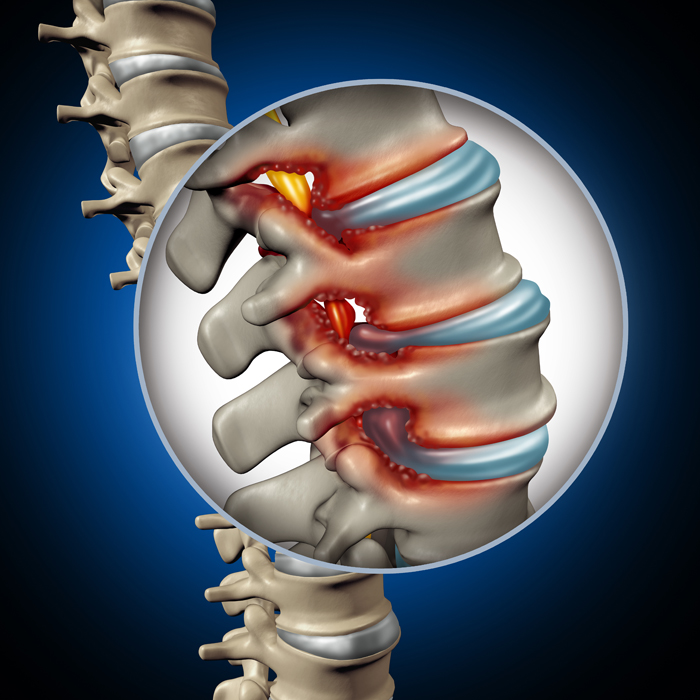Spinal Stenosis Treatment in Kondapur, Hyderabad
Narrowing of the spinal cord is referred to as Spinal Stenosis.
Most common symptoms include pain, muscle weakness and numbness. These are often caused due to normal wear and tear. It can be treated by going through certain medical procedures and surgeries.

What is Spinal Stenosis?
Spinal Stenosis, also known as Spinal narrowing, is a condition in which the space within your spine begins to reduce and becomes narrow. It can occur anywhere along the spine and is typically a gradual process. Too much
narrowing can compress your nerves and cause problems.
It is most commonly caused due to ageing because with age the tissues in your spine may start to thicken and your bones may start growing bigger or, it is also sometimes caused due to certain health conditions.
Spinal Stenosis can cause numbness, weakness and pain in areas like the lower back.
What Are The Symptoms of Spinal Stenosis?
Spinal Stenosis is a gradual process and the symptoms typically grow over time, as the bones start growing bigger and the nerves start thickening, causing the nerves to become more compressed.
The common symptoms of Spinal Stenosis are as follows:
- Lower back pain
- Balance problems
- Numbness in legs or buttocks
- Arm or leg weakness
- Impaired bladder control
- Muscle weakness
- Pain in legs, thighs or buttocks
When to See a Doctor?
If you notice any of the following symptoms:
- Pain the lower back
- Numbness or tingling in legs, foot or buttocks
- Weakness in legs or foot
- Heavy feeling in the legs
Or any of the symptoms mentioned before, you should seek immediate medical attention and schedule your appointment with healthcare professionals at the earliest.
Request an appointment at Apollo Spectra Hospitals, Kondapur
Call 1860-500-2244 to book an appointment
How Can We Prevent Spinal Stenosis?
There are no proven ways to prevent Spinal Stenosis, however, taking certain steps and inculcating certain habits in your daily routine to promote good spine health can help. Some of the good habits may include:
- Exercising regularly: Getting regular exercises like walking, weight training, swimming, cycling can help strengthen your muscles that support your lower back and also helps keep your spine flexible.
- Maintaining good health: Maintaining a good and healthy weight is necessary as excess weight can put a lot of pressure or stress on your back which may increase the chances of being diagnosed with Spinal Stenosis
- Maintaining a good posture: Sleeping on firm mattresses and sitting on a chair and focusing on maintaining the posture may also help.
How is Spinal Stenosis Diagnosed?
When you experience signs and symptoms like muscle weakness or weakness in legs or foot, and pain or numbness in the lower back, legs, foot or buttocks then you can consult a healthcare professional at Apollo Kondapur.
To make a diagnosis, your healthcare professional may ask you to go through certain diagnostic tests and procedures, such as:
- X-Ray
- CT Scan
- MRI Scan
- Electromyogram
- Bone scan
How Can We Treat Spinal Stenosis?
To treat Spinal Stenosis, you may have to go through surgeries or your doctor might prescribe medications or injections.
Your doctor may start by prescribing you medications or physical therapies to help strengthen your muscles.
Injections like the cortisone injection into your spinal column can help reduce swelling, furthermore, Nonsteroidal anti-inflammatory drugs (NSAIDs) can help ease the pain.
Several surgeries are also conducted to treat Spinal Stenosis, for instance:
- Laminectomy
- Foraminotomy
- Spinal fusion
Spinal Stenosis is a common condition that primarily affects most people when they grow older.
Degenerative changes of the spine are seen in up to 95% of people by the age of 50. Spinal Stenosis most commonly occurs in adults over the age of 60.
Though there aren’t any sure preventive measures, exercising regularly, maintaining good health and body posture may help.
The most common cause for Spinal Stenosis is normal wear and tear as you grow older. Other common causes may include, Spinal Stenosis being the result of some disease or the result of some injuries in the spine. Being born with Spinal Stenosis is a very uncommon and rare case
This question will be best advised by your trusted healthcare professional. However, most patients with spinal stenosis respond well to non-surgical treatments and there may of course be situations when you may have to go through surgeries, for instance:
- You’ve been experiencing severe pain for a very long period.
- You’ve been experiencing numbness and tingling sensations in the arms and legs
You may have trouble walking distances or may find that you need to lean forward to relieve pressure on your lower back. You may also have pain or numbness in your legs or foot. In more severe cases, you may have difficulty controlling your bowel and bladder.
Symptoms
Our Top Specialities
NOTICE BOARD
CONTACT US
CONTACT US
 Book Appointment
Book Appointment


.svg)
.svg)
.svg)
.svg)








